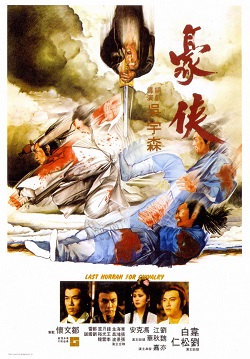Related Research Articles

Flirting Scholar is a 1993 Hong Kong comedy film directed by Lee Lik-Chi. It parodies famous works of literature which feature the same characters and settings.

Sheung Shui Wai, also known as Sheung Shui Heung (上水鄉) is an area in Sheung Shui, in the northern part of the New Territories of Hong Kong. Its population is around 6,000 people.

Jo Myong-rok was a North Korean military officer who held the military rank Chasu. In 1998, he was appointed first vice-chairman of the National Defence Commission of North Korea, Director of the Korean People's Army General Political Bureau. Previously, he was the commander of the air defence forces.

Devil's Disciples is a Hong Kong television series released overseas in February 2007 and broadcast locally on TVB Jade in July 2007.

Last Hurrah for Chivalry is a 1979 Hong Kong martial arts film written and directed by John Woo, who also produces with Raymond Chow. The film stars Damian Lau and Wei Pai. The film is a precursor to Woo's heroic bloodshed films. The film was released theatrically in Hong Kong on 11 November 1979.

Tai Tong is an area southwest of Shap Pat Heung, in Yuen Long District, in the northwestern part of Hong Kong.
Parliamentary elections were held in North Korea on 3 August 2003. Representatives were elected for five-year terms to all 687 seats of the Supreme People's Assembly, and also to 26,650 positions in city, county, and provincial People's Assemblies. All candidates were members of the three parties constituting the Democratic Front for the Reunification of the Fatherland.
Parliamentary elections were held in North Korea on 2 November 1986. 655 Deputies were elected to the parliament.

Parliamentary elections were held in North Korea on 25 August 1948 to elect the members of the 1st Supreme People's Assembly. Organised by the People's Committee of North Korea, the elections saw 572 deputies elected, of which 212 were from North Korea and 360 from South Korea.

Parliamentary elections were held in North Korea on 8 October 1962 to elect the members of the 3rd Supreme People's Assembly. Only one candidate was presented in each constituency, all of which were selected by the Workers' Party of Korea, although some ran under the banner of other parties or state organisations to give the illusion of democracy. Voter turnout was reported to be 100%, with all reportedly voting in favour of the candidates presented.
Parliamentary elections were held in North Korea on 26 July 1998. 687 deputies were elected to the tenth Supreme People's Assembly. There was only one nominated candidate per constituency - 687 candidates for 687 seats. According to the state news agency KCNA, the turnout rate was 99.85%, and 100% of participating voters cast their ballots in favour of the registered candidates. About two thirds of the deputies were new, and deputies with a military background reportedly doubled in number. Kim Jong-il was unanimously elected in constituency n°666. According to a Rodong Sinmun editorial, this proved "how deep the Korean people's trust in Kim Jong Il is and how powerful and solid the monolithic unity of the people around him in one thought and purpose and with moral obligation is."

The death of Kim Jong Il was reported by North Korean state television news on 19 December 2011. The presenter Ri Chun-hee announced that he had died on 17 December at 8:30 am of a massive heart attack while travelling by train to an area outside Pyongyang. Reportedly, he had received medical treatment for cardiac and cerebrovascular diseases, and during the trip, Kim was said to have had an "advanced acute myocardial infarction, complicated with a serious heart shock". However, it was reported in December 2012 by South Korean media that the heart attack had instead occurred in a fit of rage over construction faults in a crucial power plant project at Huichon in Chagang Province.
Parliamentary elections were held in North Korea on 9 March 2014 to elect the members of the 13th Supreme People's Assembly.

The Day of Days is a 2013 Hong Kong television period-drama serial produced by TVB under producer Leung Choi-yuen. The serial premiered on Monday, 21 January 2013 on Jade and HD Jade, and ran for 20 episodes.

Events from the year 1977 in North Korea.

The 10th Supreme People's Assembly of North Korea was in session from 1998 until 2003. It consisted of 687 deputies, and held six sessions.

Parliamentary elections were held in North Korea on 10 March 2019 to elect the members of the 14th Supreme People's Assembly. The elections were announced on 6 January 2019. With only one candidate on the ballot in each constituency, outside observers described it as a show election. 687 candidates for the DPRK deputies to the SPA were elected. Kim Jong Un did not stand for election, marking the first time that a North Korean leader did not participate as a candidate.

Tsz Tong Tsuen, also transliterated as Chi Tong Tsuen, is a village in the Kam Tin area of Yuen Long District, Hong Kong.
References
- ↑ Pak-Tong at Ethnologue (18th ed., 2015) (subscription required)